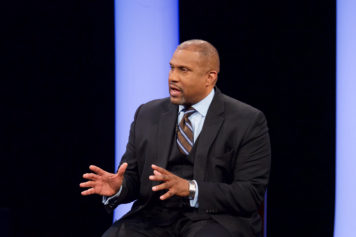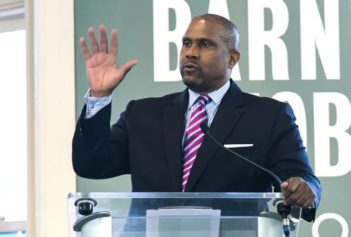Tavis Smiley has stood out in 20 years in broadcasting, and he has no intention of changing his style or substance.
He’s the rare black host with national TV and radio platforms, one who sees his job as challenging Americans to examine their assumptions on such thorny issues as poverty, education, and racial and gender equality.
In other words, he doesn’t squander his opportunities on PBS’ daily talk show “Tavis Smiley,” which marks its 10th year this month, or on public radio’s “The Tavis Smiley Show” and “Smiley & West,” the latter a forum for commentary he shares with scholar and activist Cornel West.
His quarterly “Tavis Smiley Reports” specials for PBS, in-depth looks at topics such as the relationship between the juvenile justice system and the teenage dropout rate, fit the same bold pattern.
Smiley, marking two decades in broadcasting this year, considers himself engaged in a calling as much as a career: “This is the kind of work I think needs to be done. I’m trying to entertain and empower people.”
PBS President and CEO Paula Kerger was a public TV executive overseeing New York station WNET when she became interested in launching a Smiley talk show as a companion to “Charlie Rose.” The programs air back-to-back on a number of PBS stations.
“The two of them have very different styles. Tavis has done a great job of bringing a wide range of people on to public broadcasting,” Kerger said. “He’s constantly looking at the next big idea” to bring to the national dialogue.
Smiley, 48, also doesn’t shrink from the repercussions that occur when his opinions, delivered on radio and in interviews in his distinctively punchy cadence, strike a nerve. He has drawn the ire of conservatives and, because of his insistent criticism of President Barack Obama’s policies, that of some liberals and African-Americans.
Smiley contends that members of the Obama administration, whom he didn’t identify, have pressured sponsors to drop their support of his projects, including his antipoverty initiatives. The White House had no comment, said a spokesman, Kevin Lewis.
While Smiley said he understands the desire of blacks to stand protectively by the first African-American president, he’s adamant about his right to take Obama to task on rising black unemployment, the use of military drones and other issues.
“This administration does not like to be criticized. And the irony of it is, there’s nothing I have tried to hold the president accountable on that my white progressive colleagues have not,” Smiley said. “They’re labeled courageous critics, but if I say it, I’m an ‘Obama critic.’ There’s race at play in the very question.”
He’s unlikely to find boosters on the right. National Review senior editor Jay Nordlinger in 2002 dismissed him as “the black leftist radio personality,” and then-Fox News Channel commentator Glenn Beck spurred anti-Smiley letter-writing campaigns to PBS, Smiley said.
Read more: sacbee.com


